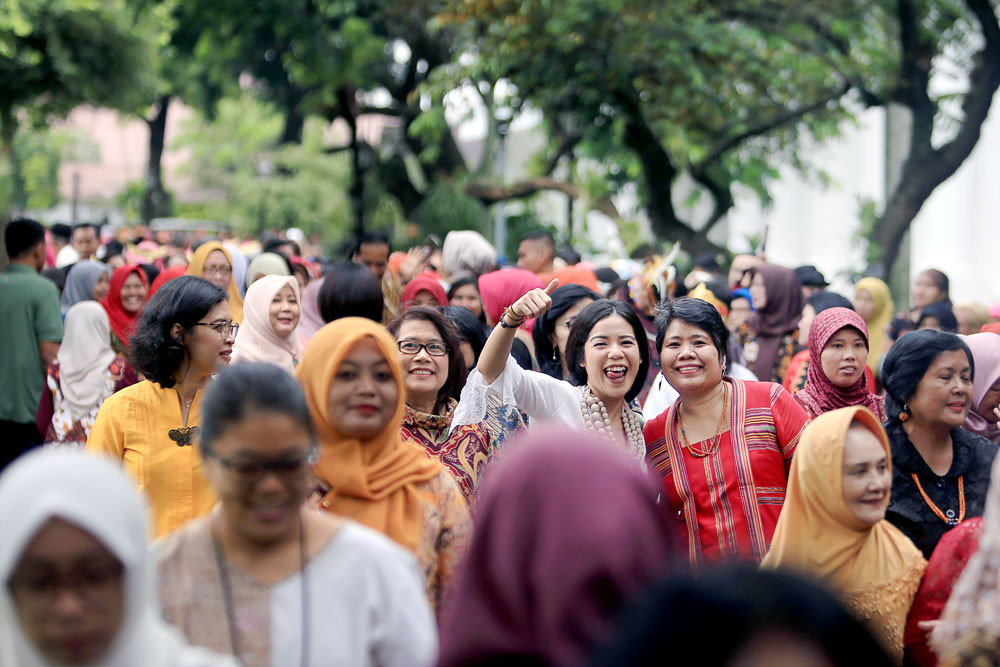Popular Reads
Top Results
Can't find what you're looking for?
View all search resultsPopular Reads
Top Results
Can't find what you're looking for?
View all search resultsEmpowering invisible women
Change text size
Gift Premium Articles
to Anyone
 Walk this way: Activists from women’s grassroots communities from 34 provinces across the country walk to the State Palace to meet with President Joko “Jokowi” Widodo on Wednesday. The meeting, titled “Strengthening the nation together”, was held to commemorate International Women’s Day, which falls on March 8. (The Jakarta Post/Seto Wardhana)
Walk this way: Activists from women’s grassroots communities from 34 provinces across the country walk to the State Palace to meet with President Joko “Jokowi” Widodo on Wednesday. The meeting, titled “Strengthening the nation together”, was held to commemorate International Women’s Day, which falls on March 8. (The Jakarta Post/Seto Wardhana)
R
oughly half of the 192 million eligible voters in the upcoming general elections are female, which provides much potential for presidential and legislative candidates to make their campaigns sound as good as possible for women.
Commemorations of International Women’s Day on March 8 in the country have highlighted many facets showing that whoever wins, empowering women at the grassroots remains a formidable task. This task, which needs the continued involvement of civil society organizations working with the local and central governments, is needed to encourage women to speak up and raise awareness and thus take action on their concerns, to embolden them in decision-making. Those organizations and governments have so long ignored them, even to the point of not acknowledging their existence.
At the State Palace on Wednesday during a gathering with President Joko “Jokowi” Widodo, one fisherwoman from West Sulawesi was among those pictured in a brief video on women’s significant roles in their communities.
After the event, Nurlina of the Pangkep Islands reiterated that her main goal was to have as many women like her own “fisherman cards”, initiated by the Maritime Affairs and Fisheries Ministry. The main obstacle, she said, was that “no officials believe there are fisherwomen”, as women are only known to help their husbands, while many women actually engage in the fisheries at sea and on the business side. Among other public services, the cards enable fisherwomen to get insurance.
A member of a customary village council in North Lombok, Saraiyah, said the involvement of women in budget planning had helped to increase the allocation for things they considered crucial, such as health and education services, including literacy classes for adult women.
At a national seminar on child marriage held on Wednesday, Nur Rofiah of the Indonesian Women’s Ulema Conference (KUPI) said the experiences of girl-mothers were likely considered “not too important” as women were often seen as lesser human beings. In its first conference in 2017 KUPI had issued a fatwa stating that preventing child marriage is mandatory in Islam, given its hazards to children and their offspring and also its contribution to intergenerational poverty and Indonesia’s high maternal mortality rate, as many have cited. However, changing the 1974 Marriage Law, which lends justification to girls becoming wives and mothers, would take considerable time.
The deliberations that led to the fatwa, Nur Rofiah said, were enabled by women ulema listening to the experiences of religious leaders who were girl-brides and girl-mothers themselves. Providing support and confidence to these women has emboldened them to address child marriage in their communities. As the newly released annual report of the National Commission on Violence Against Women shows, the voiceless also include survivors of incest. To even know of their existence and to help their recovery, it is often sympathetic local women who are trusted and who therefore can reach out to them.
Despite NGOs, state and government bodies working to end discrimination, empowering women at the grassroots level would go a long way to help the marginalized find their own voices.








